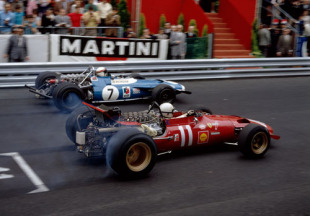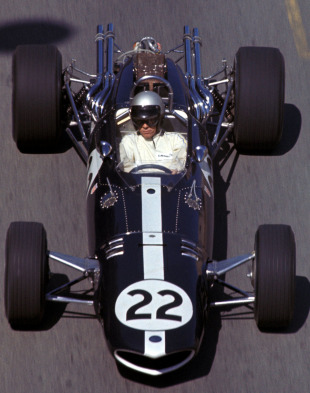- Ask Steven
F1's best losers, famous Belgians and chasing crumpet

- Drivers:
- Chris Amon
- |
- Jean Behra
- |
- Thierry Boutsen
- |
- Bertrand Gachot
- |
- Olivier Gendebien
- |
- Dan Gurney
- |
- Nick Heidfeld
- |
- Jacky Ickx
- |
- Jacques Laffite
- |
- Niki Lauda
- |
- Stirling Moss
- |
- Alain Prost
- |
- John Watson
Who has led the most GPs without ever winning one? asked Mike Broome from London
I believe that there are three drivers who have led seven different grands prix without ever winning one. They are the New Zealander Chris Amon (who always seems to pop up in these "best driver never to..." questions), the 1950s driver Jean Behra and, moving swiftly up to date, Nick Heidfeld, who led four races in 2008 alone without managing to stay there. Of these, Amon led the most laps in total without ever being in front on the one that counted - the last one - with 183 in all.
I remember Jacques Laffite winning the first two GPs of 1979, but not going on to win the world title. Has anyone else managed this? asked Colin Harris from York
It's true that the Frenchman Jacques Laffite, driving a Ligier, won the first two Grands Prix of 1979, in Argentina and Brazil. But the car proved a little fragile after that, and Laffite failed to finish any of the next three races: he ultimately slipped to fourth in the championship standings. Only two other drivers have started a season in such style but not gone on to take the title (although unlike Laffite they did win it in other years): Niki Lauda, who won in Brazil and South Africa in 1976 but, after his near-fatal crash in Germany later in the year, ended up a point behind eventual champion James Hunt; and Alain Prost, who won in South Africa and Brazil in 1982 but ended up fourth in the table behind champion Keke Rosberg.
Will Virgin's new driver Jerome d'Ambrosio be the first Belgian to drive in F1? asked Billy Montgomery from Ayr
Far from it: more than 20 Belgian drivers have taken part in the F1 world championship, the most recent being Bertrand Gachot, whose last race was in 1995. Belgium's most successful F1 driver was Jacky Ickx, who won eight GPs (mostly in a Ferrari) and finished second in the world championship in both 1969 and 1970. More recently Thierry Boutsen won three GPs for Williams, and finished fourth in the world championship in 1988. Before that Olivier Gendebien never finished first in a Grand Prix, but he did win the Le Mans 24-hour race on four occasions (Ickx won it six times). There is something for Jerome to aim for, though: no Belgian has yet won the Belgian Grand Prix.

What do you think was the best-looking F1 car of them all? asked Tom Lance from Liverpool
Somehow it has to be a Ferrari ... there's something about that deep red colour which just epitomises motor racing. I think my favourite ones are the big late-1950s models, still with the engine in the front, which look very fast and very scary. Later innovations like aerodynamic wings and high air-boxes rather spoil the pure design lines in my opinion. I once read that the Eagle-Weslake, which Dan Gurney drove in the mid-'60s, was a good-looking car too, and I wouldn't disagree, although the Lotus 49 from around the same time, with its eye-catching colour scheme, was good to look at too - and was seen rather more often as it won more races. Coming up to date, when most of the cars are fairly similar in design, I rather like the look of the new Lotus, with its retro colour scheme, and the 2010 Renaults.
Fernando Alonso won the infamous "Crashgate" Singapore GP in 2008 despite starting from 15th on the grid. What's the furthest back any eventual winner has started? asked Ian Cooper from Kent
The record-holder is Britain's John Watson, who started the 1983 United States Grand Prix West at Long Beach 22nd out of 26 on the grid. It had been a tough qualifying session for the McLarens, which couldn't come to terms with a bumpy track: Watson's team-mate Niki Lauda was one place behind him on the grid in 23rd place. But it turned out all right on the night: Watson worked his way to the front, taking the lead about halfway through the 76-lap race, and Lauda ended up second. The previous year Watson had won the Detroit GP after starting 17th on the grid.
In a recent article by Stirling Moss , he used the phrase "chase the crumpet". This intrigues me. Could you tell me the meaning of that phrase? asked Jud Jones from the United States
This one isn't a motor-racing term - "crumpet" is a slightly old-fashioned British slang word for girls, so Sir Stirling meant that after a race he liked some female company - and motor racing has rarely been short of attractive spectators! Contemporary accounts suggest that Sir Stirling approached world champion status in crumpet-chasing as well as car-chasing.

